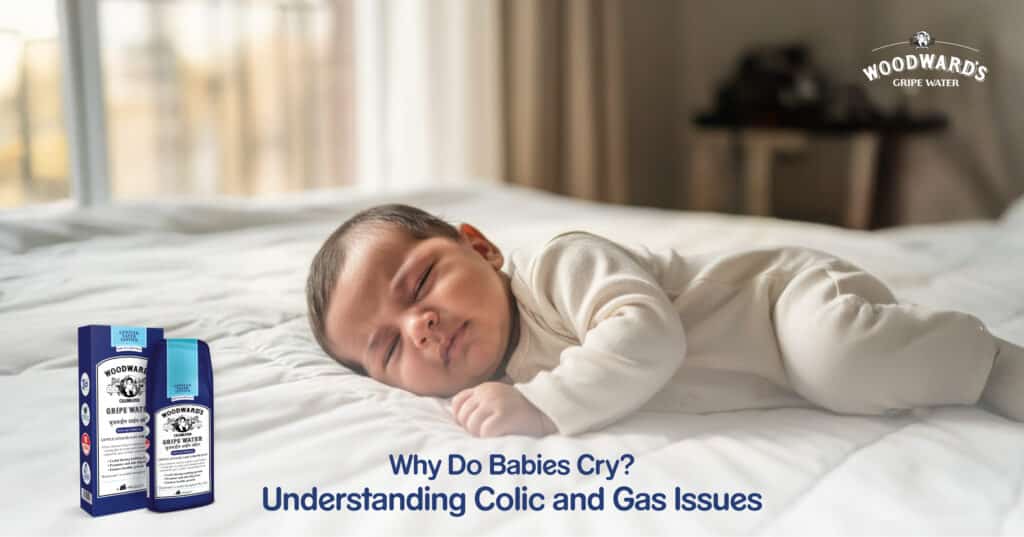Introduction – The Language of Crying
Crying is a baby’s very first form of communication. From the moment they are born, infants use tears to signal hunger, tiredness, discomfort, or simply a need for comfort. While some crying is normal, parents often become concerned when the episodes are intense, frequent, or seem to have no clear cause. Two of the most common reasons behind persistent crying are colic and gas issues, which can leave both babies and parents feeling overwhelmed. Understanding the difference can help families find relief and reassurance. Brands like Woodward’s Gripe Water are trusted by many because they offer herbal and milder options to help soothe such issues in infants.
Everyday Reasons Babies Cry
Most crying is linked to everyday needs. Babies may fuss when they are hungry, overtired, need a diaper change, or feel overstimulated. They may also simply crave closeness and comfort. These cries are typically short-lived and resolve once the baby’s needs are met. However, when crying persists despite soothing, it may point to underlying discomfort like trapped gas or colic.
What Is Colic?
Colic is defined as frequent, prolonged, and intense crying in an otherwise healthy infant. Doctors often use the “rule of three”: crying for more than three hours a day, at least three days a week, for three weeks or longer. Colic usually starts around 2–3 weeks of age, peaks at 6 weeks, and tends to resolve by 3-4 months. The crying often occurs in the late afternoon or evening and can feel impossible to soothe. While colic is not harmful, it can be extremely stressful for parents.
Why Babies Struggle with Gas
Gas is another common culprit behind baby fussiness. Infants often swallow air while feeding or crying, and their immature digestive systems make it harder to release it. Signs of gas-related discomfort include pulling knees toward the chest, arching the back, passing gas frequently, and having a bloated tummy. Some parents consider remedies like newborn gas relief drops, but it’s always best to check with a pediatrician before trying any product.
Colic vs. Gas – How to Tell the Difference
At first glance, colic and gas can look similar, but there are important differences:
-
- Gas discomfort: usually linked to feeding, comes with physical signs like a hard tummy or squirming. Relief often follows burping or passing gas. =
- Colic: occurs in predictable patterns (often evenings), lasts for hours, and persists despite soothing or feeding.
If you are unsure whether your baby is experiencing colic or gas, a pediatrician can help evaluate symptoms and rule out other issues.
How Woodward’s Gripe Water Helps
- Ingredients and Action: Woodward’s Gripe Water combines dill seed oil and sarjikakshara, which are traditionally used to alleviate stomach pain caused by gas, acidity, and indigestion. It’s described as providing “symptomatic relief to infants, babies and children from stomach pain caused due to gas, acidity and indigestion.”
- Herbal / milder approach: Many parents prefer gripe-water because it tends to be gentler than stronger medications, and is often more acceptable for mild to moderate symptoms.
- When to use: For babies showing signs of gas or mild colic (fussing, bloating, crying after feed), Woodward’s can be part of soothing routines.
- Safety & Instructions: Always follow dosing instructions, check with a pediatrician, especially for very young newborns or if there are complicating medical conditions.
Gentle Soothing Strategies for Babies
While there is no single cure, several techniques can help comfort babies:
-
- For gas: burp your baby frequently during feeds, try bicycle leg movements, and give supervised tummy time to release trapped air.
- For colic: swaddle snugly, use white noise, rock gently, or offer a warm bath to calm the baby.
Some parents ask about the best colic drops for newborns, but any medication or supplement should only be used under medical guidance.
Consistency and patience often work better than quick fixes, and many babies gradually outgrow these issues as their digestive systems mature.
When to Call the Pediatrician
While fussiness is usually normal, there are times when medical advice is essential. Contact your doctor if your baby:
-
- Has a fever or persistent vomiting
- Refuses to feed or shows poor weight gain
- Cries with an unusual pitch or tone
- Seems unusually lethargic or unresponsive
Trust your instincts—if something doesn’t feel right, it’s worth checking with a healthcare professional.
Supporting Parents Through Stress
Caring for a crying baby can feel overwhelming. Sleepless nights, constant soothing, and worry can take a toll on parents’ emotional well-being. Remember that colic and gas are temporary and do not reflect your parenting ability. Take breaks, when possible, lean on family or friends for support, and consider joining parenting groups for reassurance. Your well-being is just as important as your baby’s comfort.
Conclusion – Reassurance for Parents
Crying is a natural part of early infancy, but when it becomes frequent or difficult to soothe, colic and gas are often the culprits. Recognizing the signs, trying gentle soothing techniques, and knowing when to seek medical guidance can make this stage more manageable. The good news is that both colic and gas usually improve as babies grow, offering comfort to tired but loving parents.

